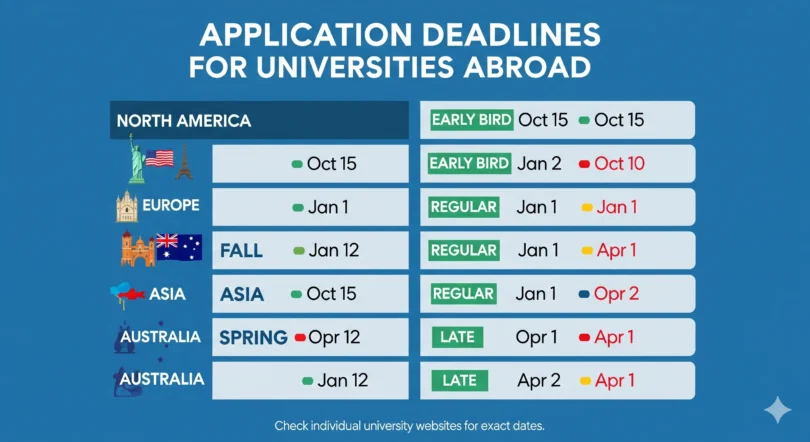Application Deadlines for Universities Abroad
Introduction
One of the most critical steps for international students planning to study abroad is keeping track of university application deadlines. Missing deadlines can delay your plans, restrict program choices, or even cause you to miss out on scholarships. With over 14 years of experience guiding students through global admissions, I’ve seen firsthand how proper planning and timely applications lead to a smoother transition and better opportunities abroad.
This post provides a comprehensive guide to help you understand deadlines, plan your application timeline, and maximize your chances of success.
1. Understanding University Application Deadlines
University application deadlines vary depending on:
- Country: Each country has its own admission cycle (e.g., Fall, Spring, Winter).
- Program Type: Undergraduate, postgraduate, or doctoral programs may have different timelines.
- Scholarship or Financial Aid: Some scholarships have separate early deadlines.
Consultant Insight: Always check the official university website for the most accurate and updated deadlines to avoid unnecessary delays.
2. Typical Application Timeline for Study Abroad
While timelines vary, here’s a general guide for international students:
- 12–18 Months Before Start Date: Research universities, programs, and requirements.
- 10–12 Months Before Start Date: Prepare standardized tests (e.g., IELTS, TOEFL, GRE, GMAT).
- 8–10 Months Before Start Date: Begin drafting personal statements, essays, and recommendation letters.
- 6–8 Months Before Start Date: Submit applications and required documents.
- 3–6 Months Before Start Date: Apply for scholarships and financial aid.
- 1–3 Months Before Start Date: Follow up with universities, receive admission decisions, and confirm enrollment.
Pro Tip: Early preparation reduces stress and increases chances of acceptance.

Common Types of Application Deadlines
3. Common Types of Application Deadlines
Universities usually have:
- Early Decision (ED): Binding, often around November for Fall intake.
- Early Action (EA): Non-binding, similar to ED but allows consideration for scholarships.
- Regular Decision (RD): Standard deadline, typically January to March for Fall intake.
- Rolling Admissions: Applications accepted until all spots are filled; earlier submissions increase chances.
Consultant Advice: Choose the type that aligns with your preference for flexibility, scholarships, and program availability.
4. How to Keep Track of Multiple Deadlines
Managing multiple universities and deadlines can be challenging:
- Create a Spreadsheet: Include university name, program, deadline type, required documents, and scholarship dates.
- Set Reminders: Use digital calendars with alerts for critical deadlines.
- Prioritize Early Deadlines: Focus on ED or EA applications first, as they often improve your acceptance rate.
Consultant Tip: Staying organized ensures you submit complete applications and avoid missing critical opportunities.

Documents Needed for University Applications Abroad
5. Documents Needed for University Applications Abroad
Most universities require:
- Academic transcripts and certificates
- Standardized test scores (IELTS, TOEFL, GRE, GMAT)
- Statement of Purpose (SOP) or Personal Statement
- Letters of Recommendation (LORs)
- Resume or Curriculum Vitae (CV)
- Passport copy and financial proof
Pro Tip: Begin gathering these documents early to avoid last-minute stress and ensure all materials meet university guidelines.

Scholarship and Financial Aid Deadlines
6. Scholarship and Financial Aid Deadlines
Scholarship deadlines often precede regular application deadlines.
- Merit-Based Scholarships: Early submission increases chances for competitive awards.
- Need-Based Scholarships: Ensure financial documents are ready.
- External Funding: Research and apply to third-party scholarships well in advance.
Consultant Insight: Students who align scholarship applications with university deadlines maximize financial support and reduce out-of-pocket expenses.
7. Tips for Meeting Application Deadlines
- Start Early: Avoid procrastination; some applications take months to perfect.
- Double-Check Requirements: Missing documents can invalidate your application.
- Proofread Essays: Grammatical errors or unclear statements reduce your chances.
- Confirm Submission: Keep confirmation emails or submission receipts.
- Follow Up: Contact admissions offices if you have questions or need clarification.
Pro Tip: Students who follow a systematic approach experience less stress and higher acceptance rates.
8. Dealing with Delays or Missed Deadlines
Sometimes unexpected events occur:
- Contact Admissions: Some universities offer late submissions in exceptional circumstances.
- Consider Next Intake: Look into Spring or Winter intakes if you miss Fall deadlines.
- Keep Backup Options: Apply to multiple universities with varying deadlines to stay on track.
Consultant Advice: Being proactive and flexible ensures you don’t miss your study abroad goals.
9. Country-Specific Deadline Tips
- USA: Early Decision (November), Regular Decision (January).
- UK: UCAS deadline for most courses – mid-January; Oxbridge and medical – mid-October.
- Canada: Deadlines vary; Fall intake often between January–March.
- Australia: Semester 1 (Feb–Mar), Semester 2 (Jul–Aug).
- Germany: Winter semester – mid-July; Summer semester – mid-January.
Consultant Insight: Always check program-specific deadlines, as STEM, MBA, or PhD programs may differ.
10. Consultant’s Final Advice
Application deadlines are the backbone of a successful study abroad journey. By staying organized, starting early, and keeping track of scholarship and visa deadlines, you can avoid stress and focus on preparing for your academic and personal growth abroad.









